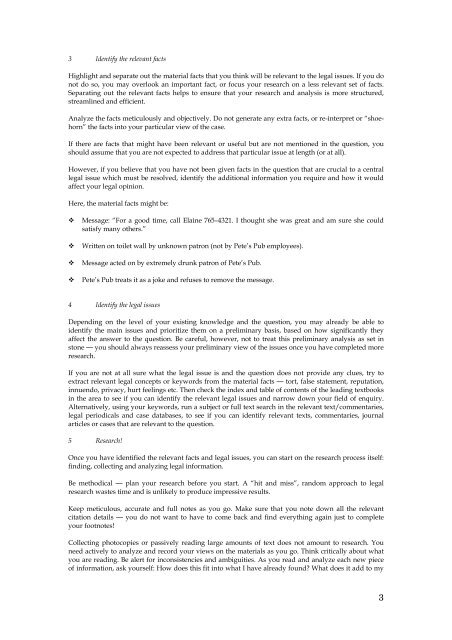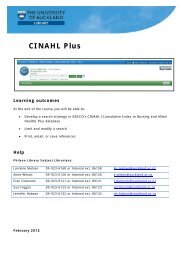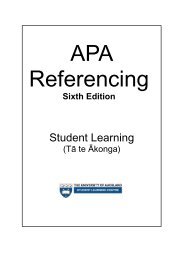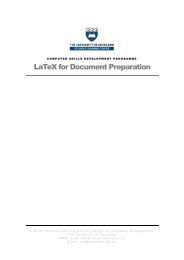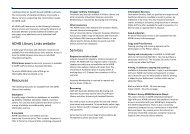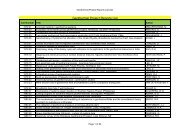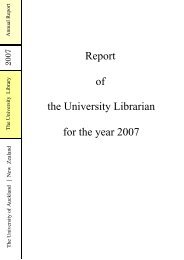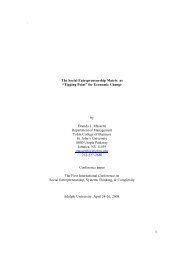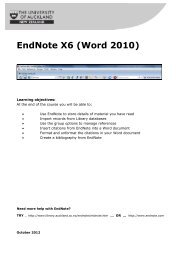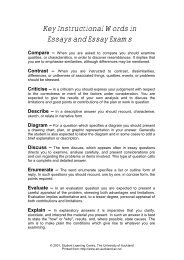Legal Writing Guide - The University of Auckland Library
Legal Writing Guide - The University of Auckland Library
Legal Writing Guide - The University of Auckland Library
You also want an ePaper? Increase the reach of your titles
YUMPU automatically turns print PDFs into web optimized ePapers that Google loves.
3 Identify the relevant factsHighlight and separate out the material facts that you think will be relevant to the legal issues. If you donot do so, you may overlook an important fact, or focus your research on a less relevant set <strong>of</strong> facts.Separating out the relevant facts helps to ensure that your research and analysis is more structured,streamlined and efficient.Analyze the facts meticulously and objectively. Do not generate any extra facts, or re-interpret or “shoehorn”the facts into your particular view <strong>of</strong> the case.If there are facts that might have been relevant or useful but are not mentioned in the question, youshould assume that you are not expected to address that particular issue at length (or at all).However, if you believe that you have not been given facts in the question that are crucial to a centrallegal issue which must be resolved, identify the additional information you require and how it wouldaffect your legal opinion.Here, the material facts might be:Message: “For a good time, call Elaine 765–4321. I thought she was great and am sure she couldsatisfy many others.”Written on toilet wall by unknown patron (not by Pete’s Pub employees).Message acted on by extremely drunk patron <strong>of</strong> Pete’s Pub.Pete’s Pub treats it as a joke and refuses to remove the message.4 Identify the legal issuesDepending on the level <strong>of</strong> your existing knowledge and the question, you may already be able toidentify the main issues and prioritize them on a preliminary basis, based on how significantly theyaffect the answer to the question. Be careful, however, not to treat this preliminary analysis as set instone — you should always reassess your preliminary view <strong>of</strong> the issues once you have completed moreresearch.If you are not at all sure what the legal issue is and the question does not provide any clues, try toextract relevant legal concepts or keywords from the material facts — tort, false statement, reputation,innuendo, privacy, hurt feelings etc. <strong>The</strong>n check the index and table <strong>of</strong> contents <strong>of</strong> the leading textbooksin the area to see if you can identify the relevant legal issues and narrow down your field <strong>of</strong> enquiry.Alternatively, using your keywords, run a subject or full text search in the relevant text/commentaries,legal periodicals and case databases, to see if you can identify relevant texts, commentaries, journalarticles or cases that are relevant to the question.5 Research!Once you have identified the relevant facts and legal issues, you can start on the research process itself:finding, collecting and analyzing legal information.Be methodical — plan your research before you start. A “hit and miss”, random approach to legalresearch wastes time and is unlikely to produce impressive results.Keep meticulous, accurate and full notes as you go. Make sure that you note down all the relevantcitation details — you do not want to have to come back and find everything again just to completeyour footnotes!Collecting photocopies or passively reading large amounts <strong>of</strong> text does not amount to research. Youneed actively to analyze and record your views on the materials as you go. Think critically about whatyou are reading. Be alert for inconsistencies and ambiguities. As you read and analyze each new piece<strong>of</strong> information, ask yourself: How does this fit into what I have already found? What does it add to my3


